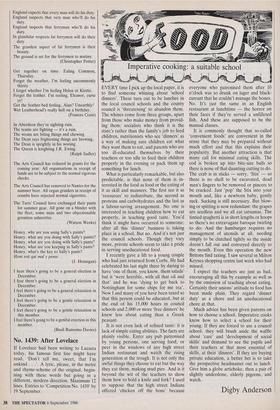Imperative cooking: a suitable school
EVERY time I pick up the local paper, it is to find someone whining about 'school dinners'. These turn out to be lunches in the local council schools and the county council is 'threatening' to abandon them. The whines come from three groups, apart from those who make money from provid- ing them: socialists who think it is the state's rather than the family's job to feed children, nutritionists who see 'dinners' as a way of making sure children eat what they want them to eat, and parents who are too ill-educated themselves by their teachers or too idle to feed their children properly in the evening or pack them up something for lunch.
What is particularly remarkable, but also predictable, is that none of them is in- terested in the food as food or the eating of it as skill and manners. The first see it as `resources' to redistribute, the second as proteins and carbohydrates and the last as a labour-saving arrangement. No one is interested in teaching children how to eat properly, in teaching good taste. You'd think it might have occurred to someone: after all this 'dinner' business is taking place in a school. But no. And it's not just the council schools. Though they vary more, private schools seem to take a pride in serving uneducational food.
I recently gave a lift to a young couple who had just returned from Corfu. He had celebrated his last night there by daring to have 'one of them, you know, them salads' but it 'were horrible, with all that oil and that' and he was 'dying to get back to Nottingham for some chips for me tea'. Now I and many of you have been taxed so that this person could be educated, but at the end of his 15,000 hours in council schools and 2,000 or more 'free dinners' he knew less about eating than a Greek peasant.
It is not even lack of refined taste: it is lack of simple eating abilities. The facts are plainly visible. Enter any pub patronised by young persons, one serving food, or peer in the windows of any high street Indian restaurant and watch the rising generation at the trough. It is not only the awful things they choose to eat but the way they eat them, making mud pies. And is it beyond the wit of the teachers to show them how to hold a knife and fork? I used to suppose that the high street Indians offered 'chicken off the bone' because everyone who patronised them after 10 o'clock was so drunk on lager and black- currant that he couldn't manage the bones. No. It's just the same in an English restaurant at lunchtime — the horror on their faces if they're served a unfilleted fish. And these are supposed to be the manual classes.
It is commonly thought that so-called `convenient foods' are convenient in the sense that they may be prepared without much effort and that this explains their popularity. But another attraction is that many call for minimal eating skills. The cod is broken up into bite-size balls so there is none of that daunting cutting to do. The crab is in sticks — sorry, `Stix' — so there is no shell to be excavated, dead men's fingers to be removed or pincers to be cracked. Just 'pop' the Stix into your mouth and, like a newborn baby, gently suck. Sucking is still necessary. But blow- ing or spitting is now redundant: the grapes are seedless and we all eat satsumas. The tinned spaghetti is in short lengths or hoops so there's no extravagant baroque twirling to do: And the hamburger requires no management of utensils at all, needing simply to be clutched tightly so the inside doesn't fall out and conveyed directly to the mouth. Even this operation the new Britons find taxing. I saw several in Milton Keynes shopping centre last week who had missed.
I expect the teachers are just as bad, encouraging all this by example as well as by the omission of teaching about eating. Certainly their unions' attitude to food has been made plain. They regard 'dinner duty' as a chore and an uneducational chore at that.
Much advice has been given parents on how to choose a school. Imperative cooks know how to select a school for their young. If they are forced to use a council school. they will brush aside the waffle about 'care' and 'development of social skills' and demand to see the pupils and their teachers at that most essential of skills, at their 'dinners'. If they are buying private education, a better bet is to take the prospective headmaster out to lunch. Give him a globe artichoke, then a pair of slightly underdone, elderly pigeons, and watch.
Digby Anderson






































 Previous page
Previous page